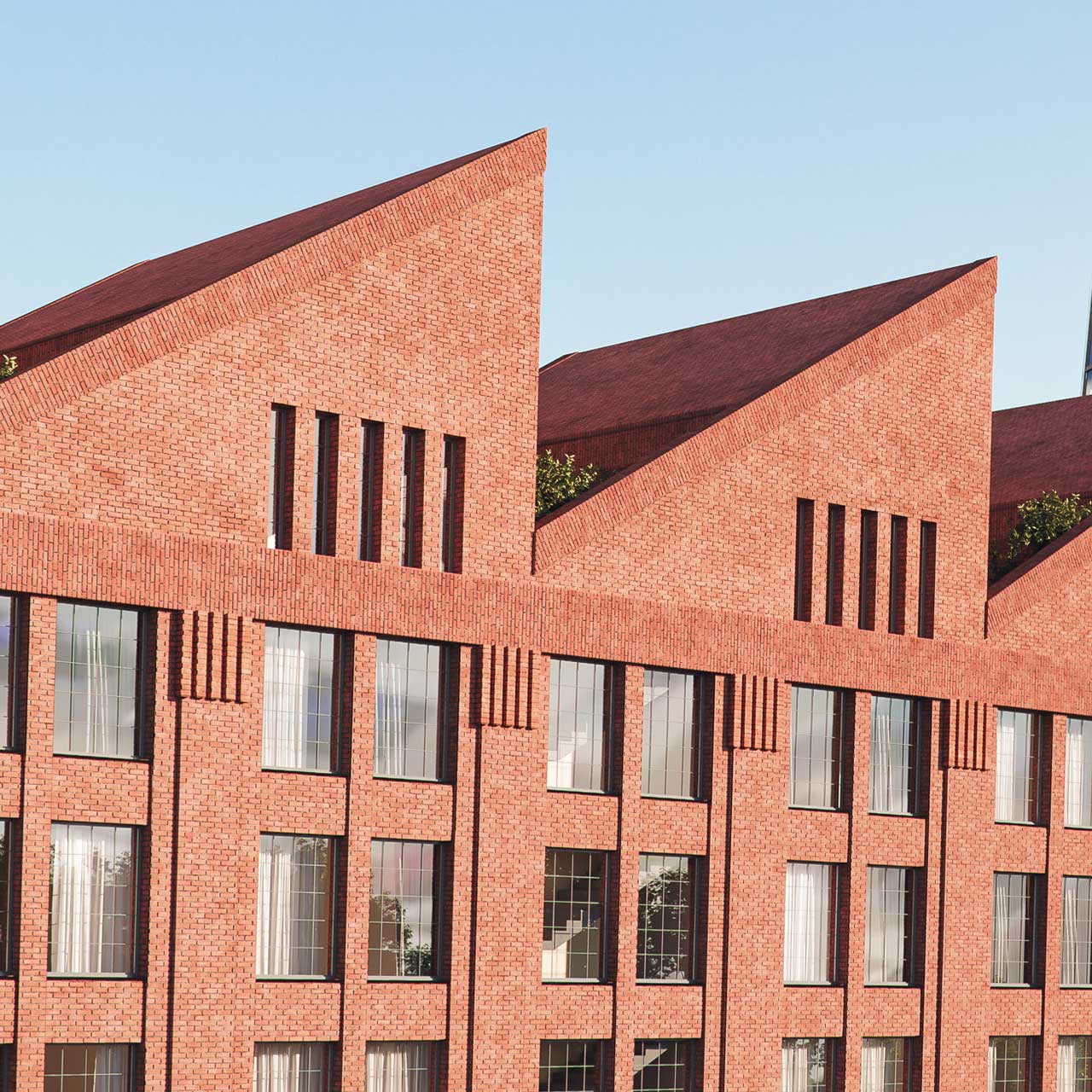Lihovar in 19th century
Taken from the book Lihovarníci Fischlové by Vladimír Hrbek.
The distillery was founded in 1879–1880 by Siegmund Fischl and Adolf Rosenbaum, and it operated under the name “Lihovar M. Fischla a synové” from 1906. From the 1920s, the distillery site was connected to Smíchov train station via a railway siding. A weighbridge and shunting winch were built. It flourished most in 1890–1906. Its filtration system was comparable to the best French and German systems. Its spirits were mainly sold to Switzerland – for producing the highest quality liqueurs and spirits for medical purposes.
In 1907, the distillery was rebuilt to increase its capacity: the refinery was raised – the “still hall” by approx. 4.8 metres, and another spirits store was built in the north-west corner. In June 1939, German management was imposed on the basis of a decree on Jewish property, and after the war, the distillery was nationalised in 1946. Distillery and potash operations ended on 29 April 1949. At the end of 1950, its equipment was dismantled and transferred to distilleries across Bohemia.
In 1952, some equipment was returned and spirits were once again produced here. The business was renamed “Spojené lihovary, národní podnik” (United Distilleries, national enterprise), with Lihovar as its headquarters, and it became a part of the food group known as KOLI (Konzervárny a lihovary – Canneries and Distilleries), which was involved in food processing, conservation and pickling – preservation. A large central laboratory was set up on the site for food testing and analysis.
The most significant structural change was the renovation of part of the site as a vinegar plant. The plant had 7 acidifiers and 26 vats and became the largest vinegar producer in the Czechoslovakia.
A period of dilapid
The 1980s saw the beginnings of ideas of connecting Barrandov Bridge and the Radlice radiála arterial road, one of which involved a road through the Zlíchov distillery. This was the reason why all investment activities in the distillery site ended. Why would one invest in something which may well be demolished?
Nevertheless, the former management did manage to secure at least a minimum amount of investment to ensure sustainability of production, such as investment in a new spirits warehouse. Even so, the site’s status was reflected in the dilapidated external appearance of the buildings, which later resulted in the local residents being generally of the opinion that the foreign investor had allowed the distillery to fall into disrepair.
After the revolution, new management was installed, inventories were carried out and a serious problem was uncovered – spirits were missing and as such there were arrears in payments of excise duties and VAT.
Although later investigations showed that this was the result of the sloppiness of its previous employees, with stocks of spirits in tanks no longer being used included in inventories, they still had to pay a large penalty to the tax office, and the company went bankrupt.
Zlatý lihovar, a.s., a company owned by foreign investors, purchased the company in March 1999 in bankruptcy proceedings. As well as the Zlíchov distillery, they also acquired property across the whole of Prague, e.g. Jateční, Bělehradská, Komunardů (later, the Komunardů 33 residential project was established here in 2013) and Voctářova.
At the time, the state enterprise produced 11 types of consumer spirits and three types of vinegar. Consumer spirits refers to spirits based on grain spirits with flavours and colourings added, and these included “tuzemák” (colloquially referred to as “rum”), halb und halb, apricot brandy, peach brandy, amaretto, vodka, fernet, etc. The company had two bottling lines – one for the traditional half-litre bottle and one for 0.2 l bottles. Spirits also used to be canned – e.g. 0.33 l vodka for the Russian market.
Reclamation on the horizon
The chaos that ensued in the takeover of operations by Czech management, a fall in sales and ill-advised investments led to deeper economic problems which led to shareholders deciding to cease the company’s operations in spring 2000. There were also gradual changes in the shareholder structure, and later in 2000 Michael Barnett, who had replaced one of the investors at the end of 1999, became the sole shareholder. He later ran Zlatý lihovar via Goldfin Investments Ltd. based in the British Virgin Islands.
Barnett joined the shareholder structure with reference to his family’s historical roots, with his mother coming from Valašské Meziříčí, and he wanted to build his investment on this line. Over the course of 2000, vinegar production progressively ended, employees were laid off and stocks and production technologies were sold. This continued to 2002, at which time around 60 employees worked at the site.
By the end of 2000, however, plans were being made to change the site’s zoning plan and remove Lihovar from a large development zone with a ban on construction. A change to the zoning plan featuring a multipurpose project (apartments, offices, stores, hotel) was achieved in 2003.
Wrangles between the shareholder and the former CEO and minority shareholder of the business led to the project’s implementation being postponed.
Once these “difficulties” had been overcome, negotiations began in 2007 on sale of the site to an investment group from Ireland. Unfortunately, the global financial crisis put an end to these negotiations, with all activities subsequently put on hold until the end of 2014, when shareholders assessed that the construction market was in recovery. The original project was rejected, and negotiations began with leading development groups in the Czech Republic on the suitability of building on the site. The territory’s distance from the metro ruled out office projects, and nor was it sensible to try to compete with the shopping centre at Anděl. The only possible use for the site was building apartments.
The company subsequently began choosing architects who would take on the production of a project for a zoning decision. In May 2015, Geddes Kaňka, s.r.o. began design work, and September 2015 saw the presentation of the project’s first concept.
In early 2016, a Trigema acquisition employee contacted Zlatý lihovar management, and the initial ideas of co-operating on the project were born. Barnett later determined that the project was so large that it would be good to get together with a joint venture partner. Later, the idea of a joint venture partnership became one to acquire a buyer. Trigema was interested from the outset, but problems in agreeing on conditions of the sale and poor communication meant that Barnett began discussions with other groups, of which Daramis Group was the most interested.
Almost right before the contract with Daramis was signed, however, negotiations changed again, and another entity joined the fray. Nevertheless, complex and prolonged negotiations led Michael Barnett to the decision that determined Trigema as the victor. While the price offered was lower than its rivals, Barnett prioritised the signature of a simple contract with Marcel Soural and his Trigema group.
The preliminary contract to purchase Zlatý lihovar shares was signed in autumn 2017, with one condition from Zlatý lihovar – to acquire planning permission for a residential project with 52,000 m2 gross floor area, with 90/10 residential use ratio. Zlatý lihovar a.s. presented a further three project versions before the final version of the project was approved by Prague 5 council, the Institute of Planning and Development and conservationists. Zoning permission was granted in October 2020.
As soon as zoning permission was granted, steps leading to signature of a contract on transferral of shares began, and signature occurred on 15 January 2021 at the seat of ČSOB bank, with the participation of representatives of both parties, Zlatý lihovar a.s. and Trigema a.s.
Lihovar - vision Trigema
Michael Barnett then left the Czech Republic, and Marcel Soural, as the project’s owner, was in charge of its implementation via Trigema.
Zlatý lihovar dealt with the Varna (Still) project separately, involving the conversion of this protected historical building to a multipurpose modern building featuring apartments in its upper section, offices in its central section, and a restaurant on the ground floor and first floor. The leaders of Prague 5 council at the time did not like this project, although it had received planning permission, and they asked that the project not be implemented to the extent planned.
As soon as a preliminary zoning decision was received in October 2020, Trigema began extensive work on modification of the entire Lihovar project. Marcel Soural wanted to imbue the project with an industrial character, in reference to the history of industrial Smíchov, including the site of the former distillery. London’s Kings Cross neighbourhood provided inspiration, with Trigema project managers and the Black n’ Arch architecture studio team, a studio Trigema had set up alongside David Černý, eventually taking a trip out there.
It was at this time that Trigema decided that the project should incorporate 535 apartment units, the same number of parking spaces plus 7,400 m2 of retail space across three implementation phases. Work on the Lihovar project continues at pace. The site, 2.2 ha in size with a gross floor area of 52,000 m2, has been divided into three sections. Considering the site’s location between two roads and the longer sides running from north to south, the phases have been logically divided up into NORTH, CENTRAL and SOUTH phases.
In March 2022, following the acquisition of planning permission, construction work began on the NORTH phase.
Completion of this phase, comprising 241 apartments, 14 commercial units and a green roof with garden, is planned for March 2024.
Design work on Phases 2 and 3, CENTRAL and SOUTH are also continuing and Trigema anticipates that construction will begin in April 2024, with the entire project completed by 2026.
„Our motivation is for people to remember that Smíchov begins here. Because it will change enormously in ten years. At the southern end, less than 100 meters from the residential chimney, the Dvorecký most is already being built. Sekyra Group is building on the north side, a new transport terminal and railway station are planned, so within ten years it will be an amazing part of the city comparable to Karlín.“
Marcel Soural, Trigema a.s.
First results: Reconstruction of historic Varna
The preliminary phase would involve the complex reconstruction of the still building (Varna). The original owner’s idea of renovating the still building for commercial use was abandoned, and it was decided instead to convert it into a modern art gallery. It was subsequently decided that the still building would house a gallery of the artworks of sculptor David Černý.
Individual storeys essentially copy the original steel technology platform structure. The entire west façade is renovated to look like it originally did, as seen in photographs of the period. The original circular window was restored in the gable. The still building roof was sensitively renovated to be reminiscent of the original 1907 roof, with just a skylight being constructed between the original fans, ensuring the presence of natural light in the new still space. The architects, and subsequently also the Trigema Group builders, strived to ensure the original structure was preserved.
Renovation of the still building was completed in November 2022, with final approval granted on 12 December 2022.
The originally anticipated investment costs for the renovation were surpassed threefold, mainly due to conservation protection work being required, involving special work on individual structures, a complex set-up and last but not least the fact that the cost of construction work and materials rose steeply during the period the renovation was implemented (immediately following the beginning of the conflict in Ukraine). Trigema spent almost 75 million crowns on this investment.
Immediately following final approval, the renovated building was leased to David Černý at a nominal price, and he subsequently began to install his exhibits there. The gallery was given the name Musoleum, and was officially opened on 1 April 2023.
reconstruction galleryDominants of the future LIHOVAR
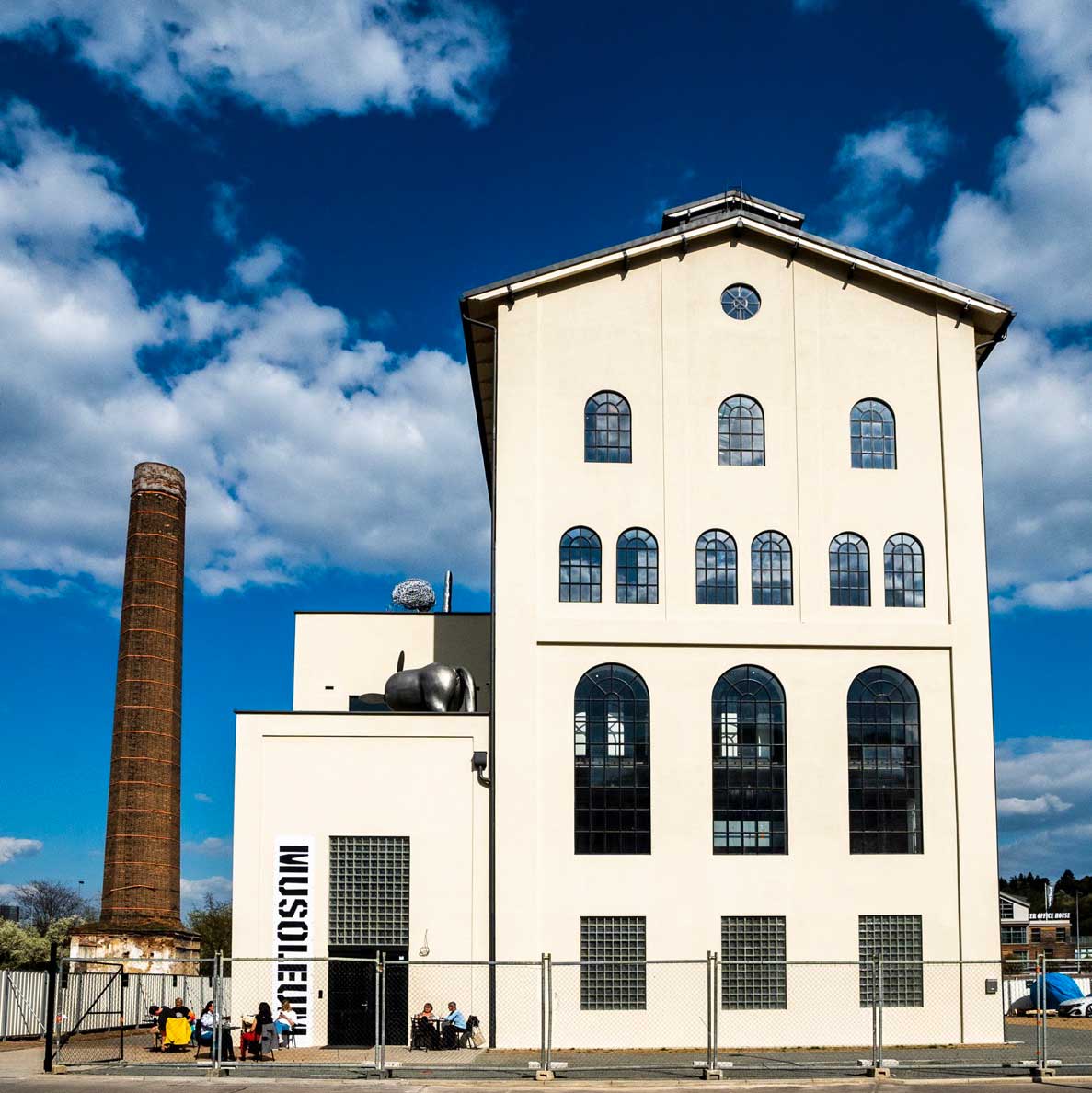
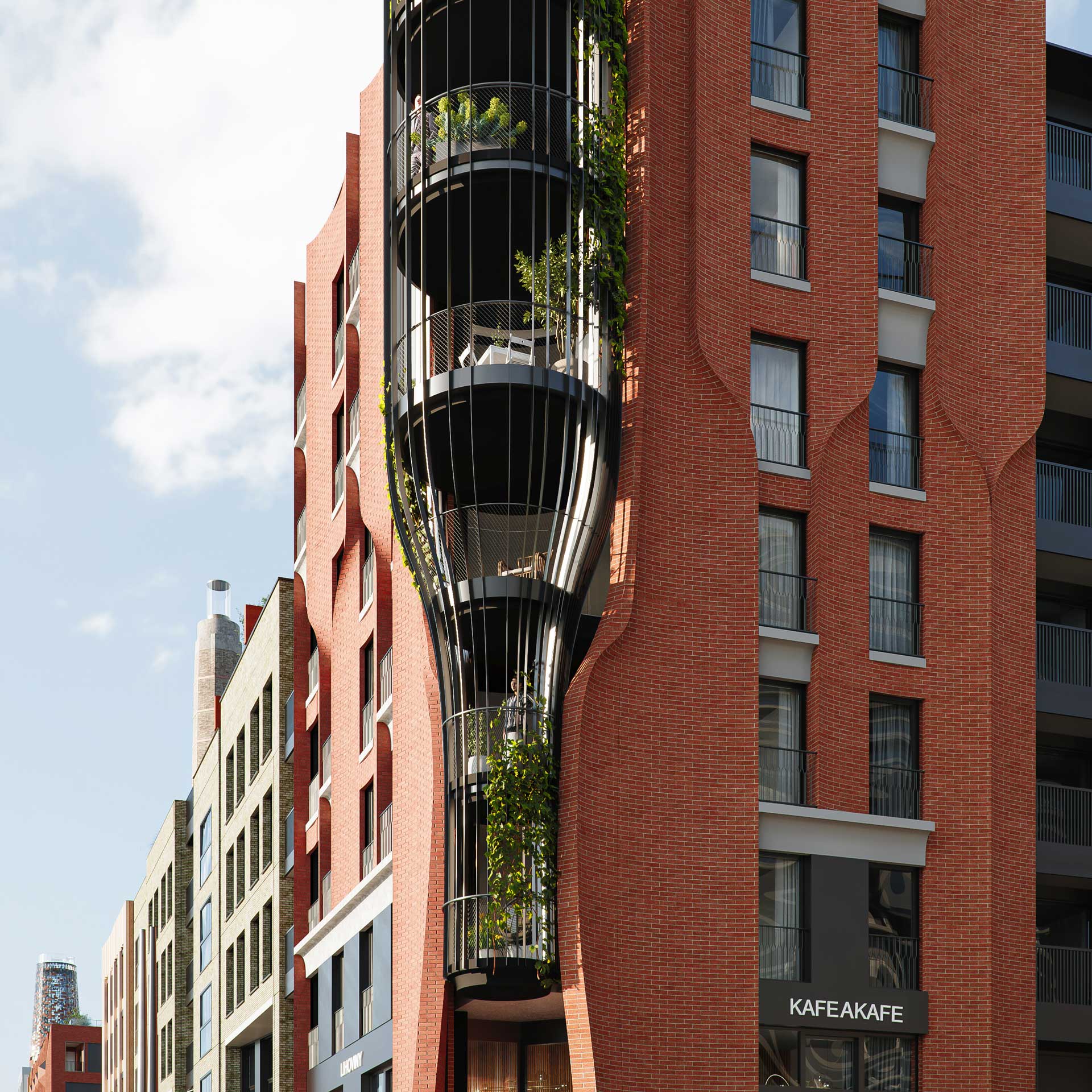
Corner house Flaška
The first architectural landmark, which reminds of the original function of the area, and which can be seen on the way from Prague, is the corner of the block building, where the loggias on the individual floors are shaped into the silhouette of a bottle turned upside down and neck down.

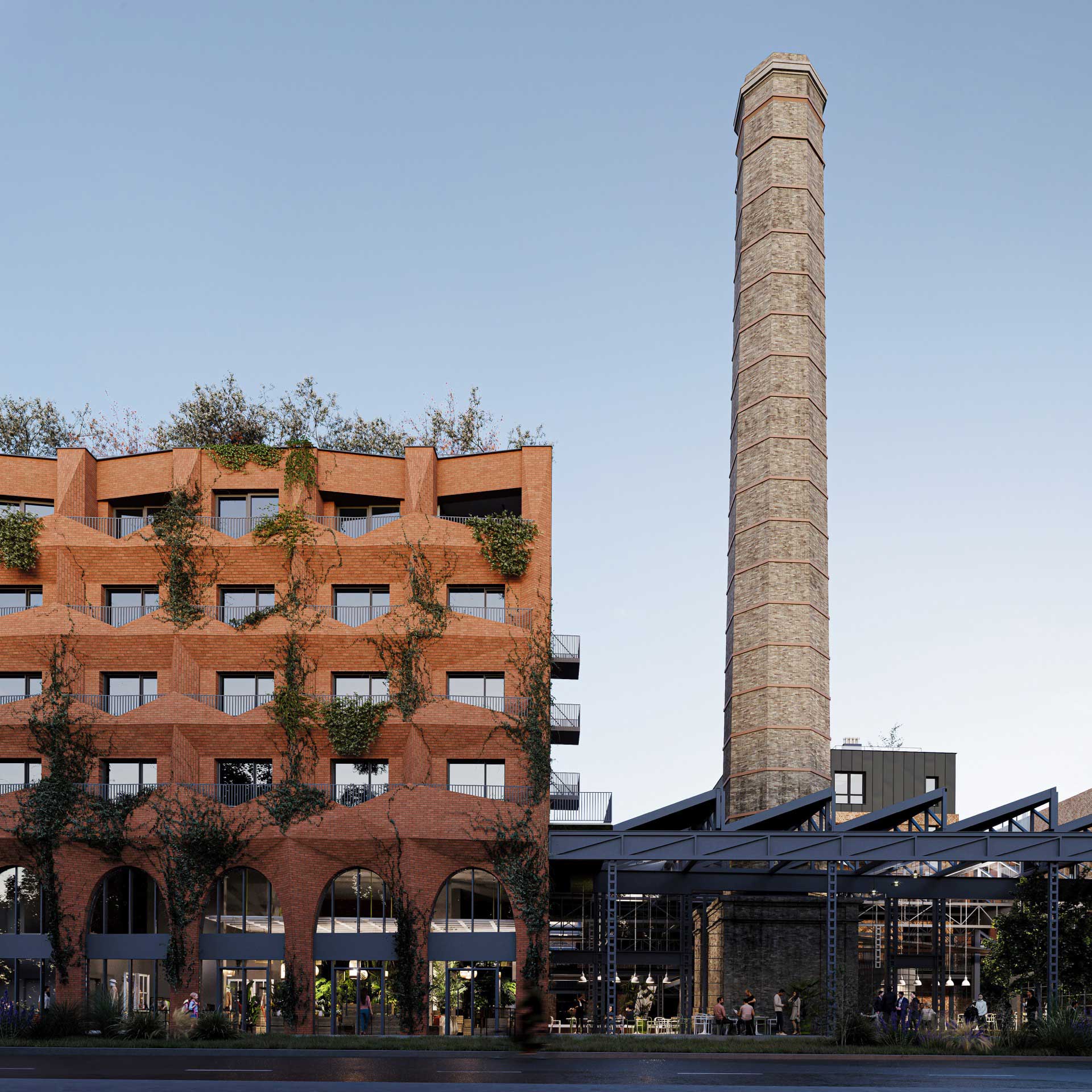
Chimney with a viewing lift
Phase Two will incorporate a cultural and community centre. Lihovar won’t be “just” homes, but will become a place for meeting up, culture and entertainment. A place where living is promoted into a cultural and community experience, and whose spirit also tells the life stories of its inhabitants. Part of the non-residential function is also a designed viewpoint on top of the reconstructed original chimney.

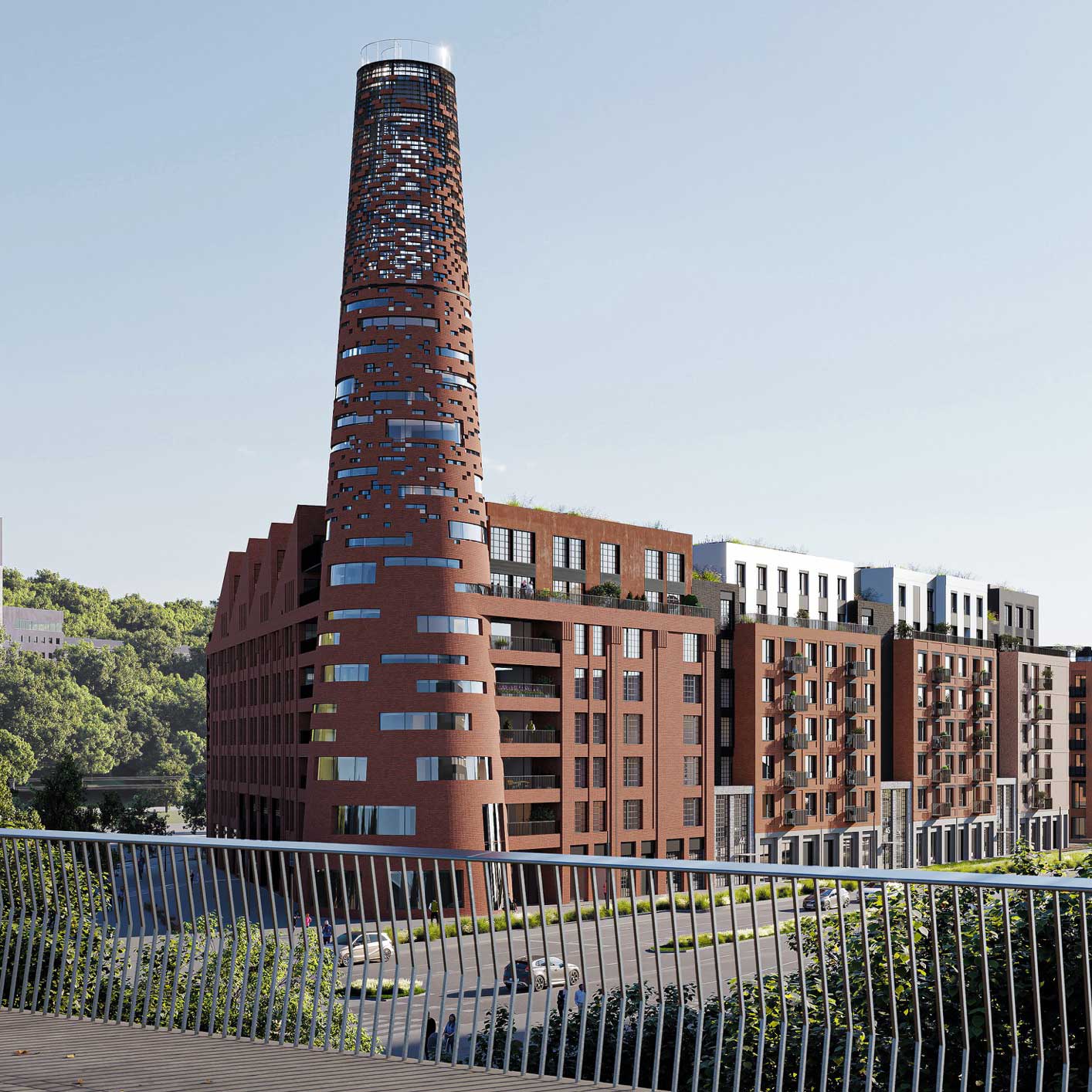
Residential chimney
Homes in Lihovar’s third phase will provide unique and original architecture referring back to the former factory site. The most distinctive dominating feature is the chimney converted into apartments, notionally opening the gates not just to the entire site, but also to the whole of the south of Prague.


